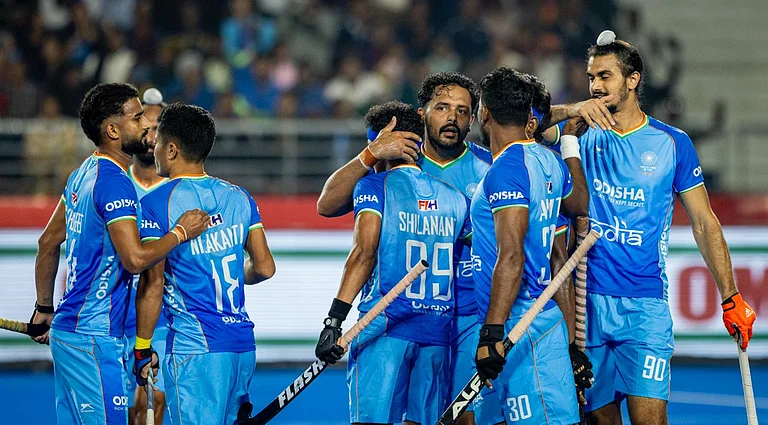Pakistan Prime Minister Imran Khan appeared to be struggling to save his government on Friday after it emerged that 24 dissident lawmakers from his own party may vote against him on the no-trust motion in Parliament while two of his allies suggested a "minus-Imran Khan" formula to resolve the raging political crisis.
Around 100 lawmakers from the Pakistan Muslim League-Nawaz (PML-N) and Pakistan Peoples Party (PPP) submitted a no-confidence motion before the National Assembly Secretariat on March 8, alleging that the Pakistan Tehreek-e-Insaaf (PTI) government led by Khan was responsible for the economic crisis and the spiralling inflation in the country.
The National Assembly session for the move is expected to be convened on March 21 and the voting is likely to be held on March 28.
The Muttahida Qaumi Movement Pakistan (MQM-P) and Pakistan Muslim League-Quaid (PML-Q), the two allied parties of Khan's PTI have presented a "minus- Imran Khan" formula to save the incumbent government ahead of voting on the no-confidence motion.
MQM-P Convener Khalid Maqbool Siddiqui told Geo News that following the current developments, he thinks there was no chance for Prime Minister Khan to stay in the office any longer.
Siddiqui said that after it emerged that 24 PTI lawmakers were staying at the Sindh House, it was "very difficult" for the prime minister to survive the vote of no-confidence.
But senior PTI leader and Foreign Minister Shah Mahmood Qureshi said on Friday that there was "no room" for minus one in the party.
Addressing a press conference here, he said there was a rumour going on that "everything is okay but Imran Khan. Everything can be saved if we go towards minus one."
He declared emphatically that there is "no room for minus one" in the PTI, adding that if anyone had any misunderstanding, they should remove it.
Qureshi also urged dissident lawmakers, including those staying at Sindh House in Islamabad, to rethink their decision. He said the lawmakers were aware of the law and the Constitution, as well as, the PTI's mandate.
Khan, 69, is heading a coalition government and he can be removed if some of the partners decide to switch sides.
In the 342-member National Assembly, the Opposition needs 272 votes to remove Khan, the cricketer-turned-politician.
The PTI has 155 members in the House and needs at least 172 lawmakers on its side to remain in the government. The party has the support of 23 members belonging to at least six political parties.
Raja Riaz, one of the dissident lawmakers, told Geo News that Khan had failed to control inflation while another lawmaker Noor Alam Khan told Samaa News that his multiple grievances were not addressed by the government.
“We are part of more than two dozen members who are not happy with the government policies,” Riaz said.
The disgruntled lawmakers have been staying at Sindh House in Islamabad which is a property of the Sindh government and run by the Pakistan Peoples Party (PPP). Saeed Ghani, a provincial minister and spokesman of the Sindh government, said the lawmakers fear they will be abducted by the government.
On Friday, irate members of the ruling party stormed into the Sindh House in protest against the 24 dissident lawmakers who are staying at the PPP-run facility.
Television footage showed dozens of activists of Khan's PTI barging into the Sindh House and chanting slogans against the group of estranged lawmakers.
Dr Ramesh Kumar Vankwani, a Hindu lawmaker, is also among the PTI lawmakers staying at Sindh House.
“I was threatened and requested the Sindh Chief Minister to give me a room here (Sindh House),” he was quoted as saying by the Dawn News.
The government accused the Sindh government of abducting the PTI lawmakers to influence them by offering them huge bribes.
But Riaz said he and other dissident lawmakers were staying at the property of their own free will and were ready to move out of it if the prime minister assured them that they would be allowed to vote “according to our conscience”.
Prime Minister Khan consulted his party leaders and ministers on Thursday and was urged by Interior Minister Sheikh Rashid to impose governor’s rule in Sindh and remove its government as it was involved in buying members of the National Assembly.
“I asked the Prime Minister to impose Governor Rule in Sindh,” Rashid told the media after the meeting.
Khan is also consulting his legal team on how to disqualify the dissidents under the floor-crossing laws, but the law can be invoked after a lawmaker votes against his own party by ignoring the clear directions of the party leader.
The government has decided to approach the Supreme Court for interpretation of Article 63-A as several PTI lawmakers have announced to vote on the no-trust motion, in a violation of the party policy, Information Minister Fawad Chaudhry said.
As Khan’s grip on power weakens, he has mobilised his support base by giving a call for a big rally in the heart of the capital on March 27, with the objective of gathering one million workers.
The Opposition parties have responded to the move by asking their workers to march towards Islamabad on March 25 to occupy the D-Chowk in front of Parliament where Khan plans to hold a rally two days later.
As the political drama unfolds, the powerful army is apparently viewing the scenes from the sidelines with many experts wondering about its final move.
Pakistan Army spokesman last week told the media that the military will remain neutral, to which Khan responded days after while addressing a rally in Khyber-Pakhtunkhwa by saying humans take sides and “only animals are neutral”.
The Army did not respond to Khan’s barb, but many interpreted it as quite a predicament that Khan has got himself into after three and a half years of rule.
Khan’s PTI party came to power in 2018 and the next general election is scheduled to be held in 2023.


























